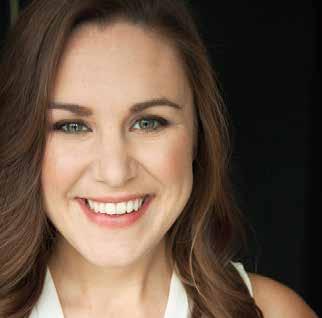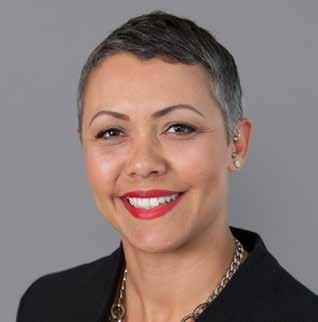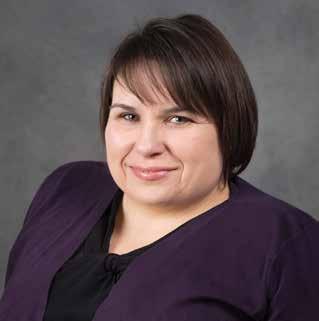
4 minute read
10 Women working to change the world: The Chicagoans
from March 9 - 15, 2020

“With our work the rewards are just endless when someone is willing to be vulnerable.”
Heather Bodie
Artistic director of Erasing the Distance Heather Bodie’s life was changed the first day she joined the program. Erasing the Distance is a nonprofit that uses theatre to educate about mental health and break the stigma around it. The group talks to people who are willing to come share about their lives, and then they use that dialogue to create a short play. Before joining this group, Bodie was the co-founder and executive producing director of The Fine Print Theatre Company, which fosters new plays that reflect current social and political issues. Then a few years after that, she started acting in the Erasing the Distance company. According to Bodie, suddenly she was able to be part of a production where she wanted everyone she knew to see it, not because she was in it, but because of what the show said. Eventually she made the transition from on stage to behind the scenes. Bodie has seen the work of this company not only change her own life, but also the lives of many around her.
Erasing the Distance photo.

“I think we need different identities and voices represented in media, but it also matters what that representation looks like and what it sounds like.”
Eve L. Ewing
As someone who has attended Chicago Public Schools, taught in them, then studied them as a scholar, Dr. Eve L. Ewing knows them well. Her book “Ghosts in the Schoolyard: Racism & School Closings on Chicago's South Side” challenges the stigma around these schools. Ewing is a sociologist of education whose research is focused on racism, social inequality and urban policy. Plus, she is an instructor for the Prison + Neighborhood Art Project, a visual arts and humanities project for people at Stateville Maximum Security Prison. She serves on the Board of Directors of MassLEAP, a nonprofit organization in Massachusetts fostering youth development through spoken word poetry. There are so many more programs she is a part of, all advocating for equality and for art. However, one of the things she is most known for is her work writing for Marvel Comics, including “Ironheart,” which is about an empowered black female. This kind of representation is something that Ewing believes the world needs.
Photo by Nolis Anderson.

"We can shape and normalize what is considered possible for the next generation of girls.”
Michelle Morales
Michelle Morales is working to make marginalized people leaders. Being a U.S.-born Puerto Rican woman has shaped her commitment to working for a better and equal world. Morales is president of the Woods Fund Chicago, which promotes social, economic and racial justice in the community. Before this position, she led the Chicago chapter of the Mikva Challenge, an organization that trains teachers and develops youth councils for civic institutions. Teaching at an alternative high school in Humboldt Park taught Morales the power of engagement and selfactualization, as well as how respecting youth is transformational for them and all those around them. She works hard to make the youth around her feel important, valued and engaged.
Woods Fund Chicago photo.

“I was able to help people find housing where, for the first time ever, they could independently come and go in their wheelchair.”
Karen Tamley
Chicago’s own Karen Tamley is proof that a person does not have to be held back because of a disability. On March 2, Tamley started as President and CEO of Access Living. She previously served as Commissioner of the Mayor’s Office for People with Disabilities in Chicago for 14 years. In 2016, Tamley was appointed by former President Barack Obama to serve on the United States Access Board, then in March 2019, was elected chair of that board. As commissioner, Tamley supervised the delivery of direct services, including home accessibility modifications and employment services to thousands of people with disabilities. Over 49,000 new curb ramps were built, the most progressive accessible building code in the nation has been established, and a taxicab initiative to increase the number of accessible taxicabs was created.
Access Living photo.

“A microphone is much more powerful than a grenade. Our art tells us who we are.”
Lena Waithe
Actress, screenwriter, producer - Lena Waithe has done it all. She even became the first African-American woman to win an Emmy award for Outstanding Writing for a Comedy Series. She has used these many platforms to advocate for racial equality. When she wrote the 2019 film “Queen & Slim,” she purposely tried to flip the usual narrative about race, and to Waithe, it was an urgent piece of art. Waithe has been a huge supporter of expressing and advocating through art, and even helped produce an art exhibit in Refinery29’s 29Rooms that was created to help people experience what it is like to be black in today’s world. Waithe also uses her platform to call for gay people of color to come out, like she did, so those of younger generations will not feel so alone. Additionally, she created Showtime’s “The Chi,” which explores the humanity behind the headlines sensationalizing the South Side of Chicago. Ultimately, Waithe works to be a voice of acceptance, authenticity, and unity.
Photo by Jesse Grant.






